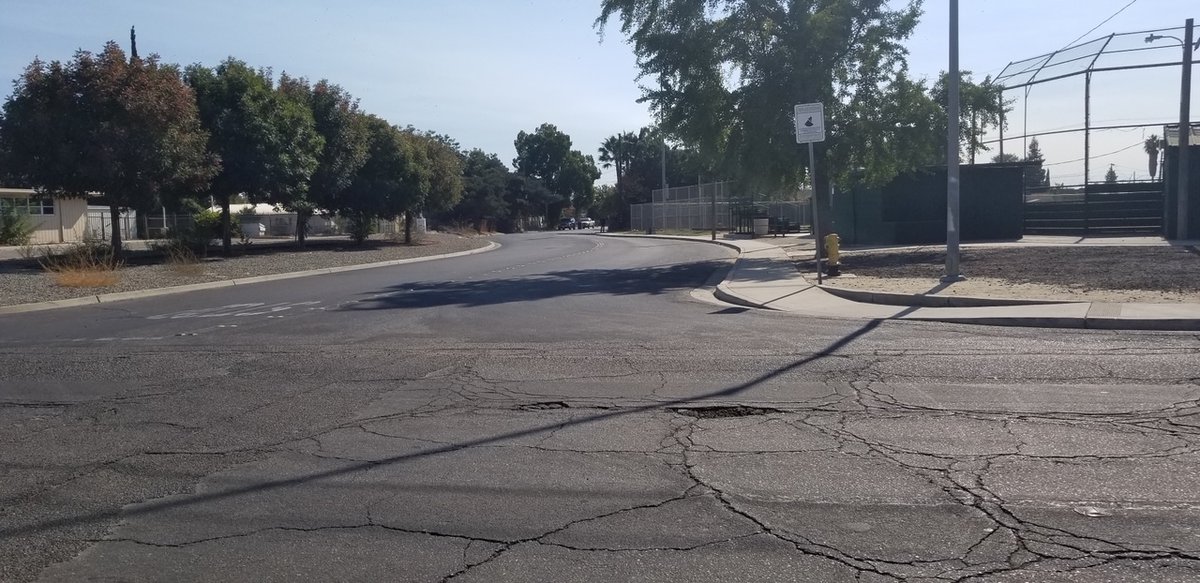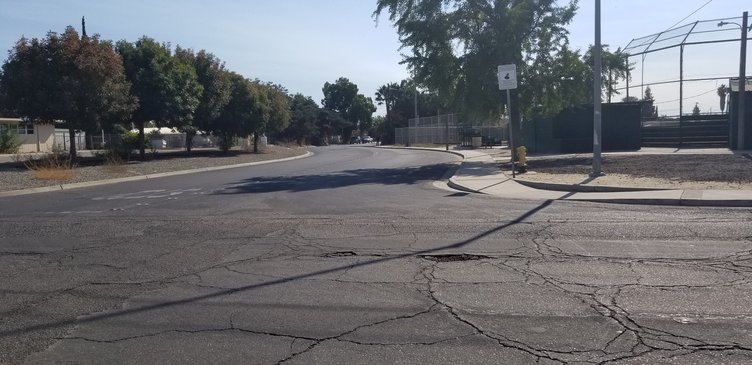Work will be done to repair a number of residential roads in Turlock when the weather once again turns hot, as the Turlock City Council voted on Tuesday to move forward with a project selection strategy that places an increased focus on neighborhood roadways.
The Council voted 4-1 — with Council member Nicole Larson dissenting — to move to a road strategy that utilizes a funding breakdown of 60 percent for residential roads, 20 percent for collector roads and 20 percent for arterial road classifications. The City of Turlock receives approximately $4.7 million annually for road rehabilitation projects from Measure L (countywide road tax), SB1 (state transportation funds), gas tax and federal and/or state grants.
In the past, the majority of road funding was used for work on main thoroughfares — such as West Main Street — because the City could leverage its own funds to get federal or state funding for the project as well. This strategy, however, didn’t leave any funding for work on neighborhood roads.
While the Council was in agreement that a new strategy was needed that focuses more on residential roads, Larson was not sold on how the list of projects that will be tackled first was created.
City staff used information from StreetSaver, a pavement maintenance computer program, to identify road projects under the 60/20/20 funding guideline. StreetSaver evaluates the available funding and applies the most economical treatments for the lifecycle of the pavement system. Preserving roads with a higher Pavement Condition Index (PCI) for a low cost per square foot is much more effective than reconstructing a road section with a low PCI for a high cost per square foot, according to Interim Development Services Director/City Engineer Nathan Bray. Because of this methodology, some of the City’s worst streets were not identified by the program for the projects list.
“I want to make sure that we can use all the data available to us so that we can try to, if we can, accomplish those residential roads that aren’t going to be subject to the feasibility and the best way to stretch our dollar compared to the ones that will,” said Larson.
Larson wanted to delay a vote on a project list until information could be presented on what roads City crews spend the most time on filling pot holes, as well as having another workshop to seek public input.
Other Council members thought the process of how the project list was made could be improved on, but decided to vote to approve the projects as presented so that the City could move forward with the process of putting bids out for project design work and contractors with the goal of a summer 2020 construction timeline.
“I’m looking at… 26 roads in Turlock that we could possibly have worked on in the first year. To me that’s a win, win, win. I think you guys did a pretty good job here and I kinda hate to see us push it down any further. I want to get it going. Let’s get on it and move on,” said Vice Mayor Gil Esquer.
While the City Council is moving forward with the approved project list and funding strategy, they agreed to continue discussion on possible new funding sources for roadway projects and using more “human data” when compiling a list of projects for future years.
The approved project list for 2019-20:
Project 1: Colorado Avenue (Marshall to East), Bell Street (Marshall to East), Sycamore Street (Minaret to Bell); Merritt Street (Minaret to Bell), Oak Street (Marshall to Cooper), Cahill Street (Rose to Oak) and Pioneer Avenue (Wakefield to Main) for a total estimated cost of $1.45 million.
Project 2: Rice Avenue (Hawkeye to Riviera), Riviera Way (Rockford to Denair), Piedmont Avenue (Denair to Rohrer), Clemson Court (Baylor to end of the cul-de-sac), Tuolumne Drive (Geer to Temple), Annhurst Avenue (Tuolumne to Minnesota), Greenboro Street (Tuolumne to Minnesota), Tammi Way (Dawn to Robbin), Robbin Way (Sherri to Tammi) and Olive Avenue (Tornell to Minnesota) for an estimated total cost of $1 million.
Project 3: Alaska Street (Flower to Main), West Avenue (Park to Main), Florence Street (West Avenue to Grant), Sunnyside Drive (Vermont to Spruce), Orange Street (Castor to South) and 9th Street (F to Elmwood) for a total cost of $1.13 million.
Project 4: Golden State Boulevard — from Geer to Canal, Hawkeye to Walnut and Tuolumne to Monte Vista Avenue — for an estimated total cost of $1.03 million.









